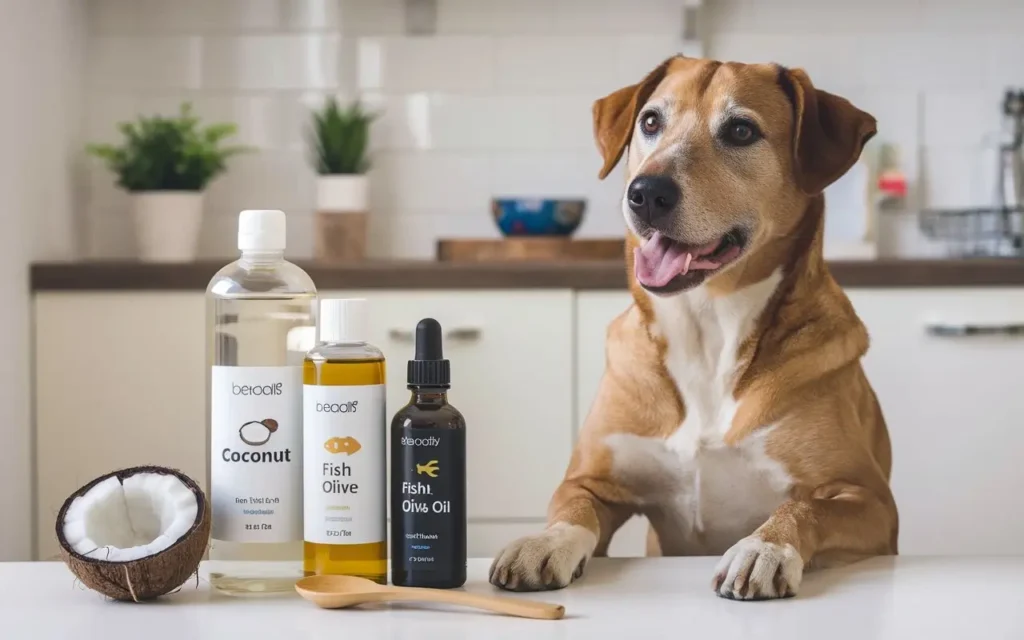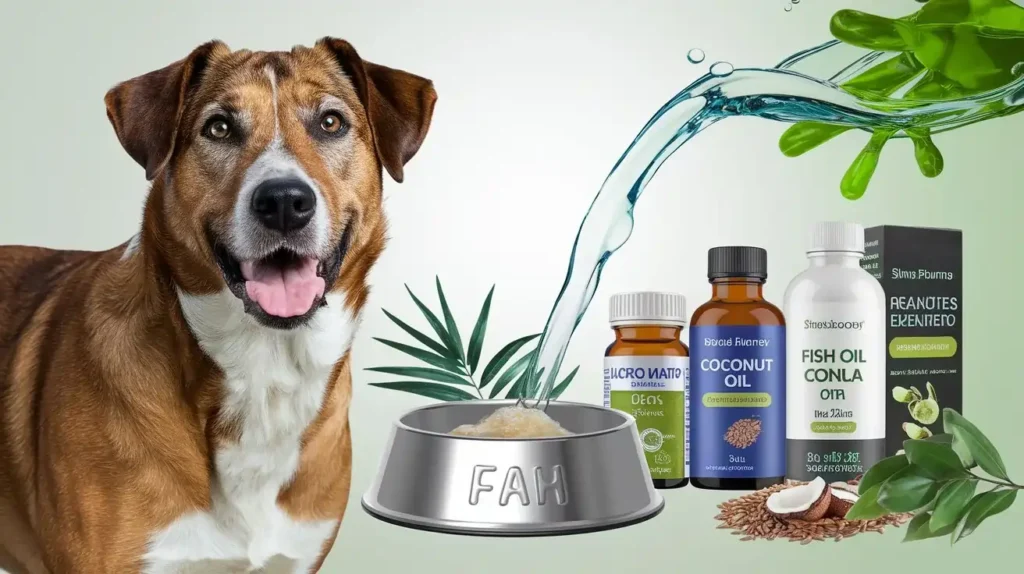Are you wondering what oils are good for dogs? As a dedicated pet owner, you’re undoubtedly always on the lookout for ways to enhance your furry friend’s health and well-being. Fortunately, oils can be an excellent addition to your dog’s diet and grooming routine, offering numerous benefits for their skin, coat, and overall health. In this comprehensive guide, we’ll explore the best oils for dogs, including fish oil, salmon oil, coconut oil, and other beneficial options that can help with everything from itchy skin to joint health.
The Multifaceted Benefits of Oils for Dogs’ Health
Before diving into specific oils, it’s crucial to understand why incorporating oils into your dog’s regimen can be so advantageous. Dogs, much like humans, require a balanced diet that includes essential fatty acids. These essential nutrients are crucial for numerous bodily processes, which include:
- Maintaining healthy skin and promoting a lustrous coat
- Supporting joint health and enhancing mobility
- Boosting the immune system to fight off infections
- Promoting heart health and improving circulation
- Aiding in cognitive function and mental acuity
Now, let’s explore some of the best oils for dogs and their unique benefits in detail.

What Oils Are Good for Dogs with Itchy Skin?
One of the most common concerns dog owners face is undoubtedly dealing with their pet’s itchy skin. Fortunately, several oils can effectively alleviate this discomfort and promote healthier skin.
Coconut Oil: A Versatile Solution for Canine Skin Issues
When it comes to what coconut oil is good for dogs, the list is truly extensive. This versatile oil is particularly effective for addressing itchy skin due to its potent antimicrobial and anti-inflammatory properties. Here’s how coconut oil can benefit your dog’s skin:
- Moisturizes dry, flaky skin
- Reduces inflammation and soothes itchiness
- Helps heal minor cuts and wounds
- Repels fleas and ticks naturally
To use coconut oil for your dog’s itchy skin, you can either apply it topically or add it to their diet. For topical use, gently massage a small amount of organic, unrefined coconut oil into your dog’s skin. As for dietary supplementation, start with a small amount (approximately 1/4 teaspoon per 10 pounds of body weight) and gradually increase as needed.
Fish Oil: The Omega-3 Powerhouse for Canine Skin Health
Another excellent option for addressing itchy skin is undoubtedly fish oil. Rich in omega-3 fatty acids, fish oil can effectively reduce inflammation and improve skin health from the inside out.
Which fish oil is the best for supporting the overall health of dogs?
When it comes to choosing the best fish oil for dogs, quality is undeniably key. Look for a high-quality, pure fish oil that’s specifically formulated for pets. Consider the following essential factors:
- Source: Opt for fish oil derived from wild-caught, cold-water fish such as salmon, sardines, or anchovies.
- Purity: Choose a product that’s been molecularly distilled to remove harmful contaminants.
- EPA and DHA content: These are the two most important omega-3 fatty acids for dogs. Look for a product with a balanced ratio of EPA to DHA.
- Form: Fish oil supplements come in liquid or capsule form. Liquid is often easier to administer, especially for larger dogs.
What is the top salmon oil for enhancing the coat and skin of dogs?
Salmon oil is a specific type of fish oil that’s particularly beneficial for dogs. It’s rich in omega-3 fatty acids and offers several unique advantages:
- Rich in EPA and DHA for maximum health advantages.
- Contains astaxanthin, a powerful antioxidant
- Supports brain function and enhances cognitive health
- Promotes a shiny, healthy coat and supple skin
When choosing the best salmon oil for dogs, consider the following important factors:
- Wild-caught vs. farmed: Wild-caught salmon oil is generally considered superior due to its higher omega-3 content.
- Purity and processing: Look for cold-pressed, molecularly distilled salmon oil to ensure purity and potency.
- Sustainability: Choose products from companies that prioritize sustainable fishing practices.
Which Oils Are Good for the skin and coat health of dogs?
While we’ve touched on coconut oil and fish oil for skin health, there are several other oils that can significantly benefit your dog’s skin and coat:
1. Olive Oil: A Mediterranean Wonder for Canine Skin
Olive oil is rich in antioxidants and can effectively moisturize your dog’s skin and promote a shiny coat. It’s also known to:
- Boost the immune system and fight off infections
- Support heart health and improve circulation
- Aid in digestion and promote nutrient absorption
To use olive oil for your dog’s skin, you can add a small amount to their food (approximately 1 teaspoon per 20 pounds of body weight) or apply it topically to dry, itchy areas.
2. Flaxseed Oil: Plant-Based Omega-3s for Dogs
Flaxseed oil is an excellent plant-based source of omega-3 fatty acids. It can help:
- Reduce inflammation throughout the body
- Improve skin and coat health significantly
- Support joint function and mobility
When adding flaxseed oil to your dog’s diet, start with a small amount (about 1 teaspoon per 20 pounds of body weight) and gradually increase as needed.
3. Hemp Seed Oil: A Well-Rounded Solution for Dog Health
Hemp seed oil is rich in essential fatty acids and has a perfect balance of omega-3 and omega-6. Benefits include:
- Promoting skin and coat health for a lustrous appearance
- Supporting joint mobility and reducing stiffness
- Reducing inflammation throughout the body
As with other oils, start with a small amount and gradually increase based on your dog’s needs and your veterinarian’s recommendations.

What is the best Omega-3 for the overall well-being of dogs?
Omega-3 fatty acids are undeniably crucial for your dog’s health, but not all sources are created equal. When considering the best omega-3 for dogs, it’s important to look at the source, bioavailability, and specific benefits.
Marine-Based Omega-3s: The Gold Standard for Canine Health
Fish oil and krill oil are excellent sources of omega-3s for dogs. They contain EPA and DHA, which are the most bioavailable forms of omega-3 fatty acids. These marine-based sources offer numerous benefits such as:
- Improved skin and coat health for a shiny appearance
- Reduced inflammation throughout the body
- Enhanced cognitive function and mental acuity
- Support for heart health and improved circulation
Plant-Based Omega-3s: A Viable Alternative for Dogs
Less bioavailable to canines than sources derived from the ocean, flaxseed oil and hemp seed oil are at least worth consideration. This is because they are both great sources of ALA, an essential fatty acid that the body can use to create the aforementioned EPA and DHA. Here are some benefits of plant-based omega-3s:
- Improved skin and coat condition
- Support for the immune system and overall health
- Potential anti-inflammatory effects throughout the body
When choosing the best omega-3 supplement for your dog, consider important factors such as:
- Your dog’s specific health needs and conditions
- Any allergies or sensitivities they may have
- The bioavailability of the omega-3 source
- Your veterinarian’s recommendations and guidance
How to Safely Introduce Oils to Your Dog’s Diet for Optimal Health
While oils can offer numerous benefits for your dog, it’s essential to introduce them safely and gradually. Here are some useful suggestions to facilitate a seamless transition:
- Start small: Begin with a small amount of oil and gradually increase the dosage over time.
- Monitor your dog: Watch closely for any signs of digestive upset or allergic reactions.
- Choose high-quality products: Opt for organic, unrefined oils whenever possible for maximum benefits.
- Consult your veterinarian: Always consult with your vet before adding any new supplements to your dog’s diet, especially if your pet has existing health conditions.
Potential Risks and Side Effects of Oils for Dogs
While oils can be incredibly beneficial for dogs, it’s important to be aware of potential risks and side effects:
- Digestive upset: Some dogs may experience diarrhea or vomiting when first introduced to oils.
- Weight gain: Oils are calorie-dense, so be mindful of portion sizes to prevent unwanted weight gain.
- Blood thinning: Fish oil can have a mild blood-thinning effect, which may be a concern for dogs with certain health conditions.
- Allergic reactions: While rare, some dogs may be allergic to certain oils.

Frequently Asked Questions About What Oils Are Good for Dogs
To help you make the best decisions for your furry friend, here are answers to some commonly asked questions about using oils for dogs:
Q: Can I use human-grade oils for my dog’s health?
A: While some human-grade oils can be safe for dogs, it’s best to use products specifically formulated for pets. These are tailored to meet canine nutritional needs and are less likely to contain harmful additives.
Q: How often should I give my dog oil supplements for optimal health?
A: The frequency of adding the oil depends on the type of oil and what your dog is specifically needing. Most pet owners add it daily, but always as instructed on the product for dosing instructions or your veterinarian.
Q: Can oils replace medication for skin conditions in dogs?
A: While oils can be beneficial for skin health, they should not replace prescribed medications for skin conditions. Always consult with your veterinarian before making changes to your dog’s treatment plan.
Q: Are there any oils I should avoid giving my dog for safety reasons?
A: Yes, some oils can be harmful to dogs. Avoid using essential oils without professional guidance, and never give your dog oils containing xylitol, a sweetener that’s toxic to dogs.
Conclusion: what oils are good for dogs
Amazingly, including the right oils in your dog’s diet and grooming may make a huge difference in your pet’s health and wellbeing. From skin problems to joint health and cognitive function, there’s quite a set of benefits that oils, such as coconut oil, fish oil, and salmon oil, can provide for our canine friends.
Remember, what oils are good for dogs can vary based on individual needs and health conditions. Always start with small amounts, monitor your dog’s response closely, and consult with your veterinarian before making significant changes to your pet’s diet or care routine.
By embracing quality oils and using them in a responsible manner, you ensure your furry friend leads a healthier life and, naturally, a happier one. So, why not venture into the world of beneficial oils for dogs today? Your four-legged companion will definitely thank you with wagging tails and shiny, healthy coats!








